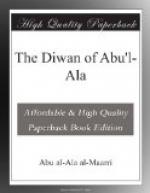The following additional quatrains may be quoted:
Unasking have we come,—too
late, too soon
Unasking from this plot of
earth are sent.
But we, the sons of noble
discontent,
Use half our lives in asking for the moon.
("We all sorely complain,” says Seneca, “of the shortness of time, and yet have much more than we know what to do with. Our lives are either spent in doing nothing at all or in doing nothing to the purpose, or in doing nothing that we ought to do. We are always complaining that our days are few, and acting as though there would be no end of them.”)
So then your hand has guarded me!
Be blessed,
And, if you like such reading,
read, I pray,
Through Moses’ book,
or credit them who say
That old Isaiah’s hand is far the
best.
Some day, some day the potter shall return
Into the dust. O potter,
will you make
An earth which I would not
refuse to take,
Or such unpleasant earth as you would
spurn?
Then out of that—men swear
with godly skill—
Perchance another potter may
devise
Another pot, a piece of merchandise
Which they can love and break, if so they
will.
And from a resting-place you may be hurled
And from a score of countries
may be thrust—
Poor brother, you the freeman
of the dust,
Like any slave are flung about the world.



